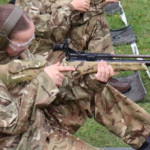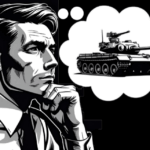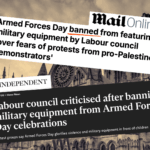The inescapable psychological cost of conflict
ForcesWatch comment
A study published in the Lancet called Violent offending by UK military personnel deployed to Iraq and Afghanistan has found that men in the UK armed forces are more likely to have been convicted of violent offences than their civilian peers. The study shows a strong link with age – that fighting and being traumatised by it tends to make those in younger age groups more likely to be violent afterwards.
Unpacking ‘recruitment’: what does the MoD mean when it says the armed forces do not run recruitment activities in schools?
ForcesWatch comment
Our education campaigner looks at the MoD's assertion that the armed forces do not go into schools for recruitment purposes. This is based on a definition of 'recruitment' that limits it to 'signing up' there and then. We argue that the armed forces are indeed recruiting in schools and that 'recruitment' is a broader activity that involves interesting young people in the idea of enlisting by engaging in the range of activities from careers talks to visits to bases.
Recently… on ‘moral injury’ and armed forces suicides in the US and UK
ForcesWatch comment
2012 was the the first year 'in at least a generation' in which a greater number of currently-serving US Army soldiers killed themselves (177) than were killed in active duty (176).
The suffering of veterans
Owen Everett, ForcesWatch
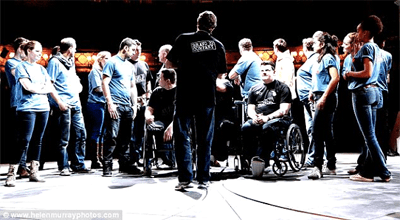
A play about and starring injured veterans, and recent government data and policies, highlights their suffering.
We shall reach them in the classrooms: promoting a ‘military ethos’ in schools
ForcesWatch comment
Earlier this month the Department for Education published a statement on their website outlining their ambition to promote a military ethos in schools across the country. Through developing projects such as Troops to Teachers and expanding schemes such as the cadets and other alternative military provision in schools (such as Challenger Troop), the government is now actively encouraging schools, especially newer Academies and Free Schools, which tend to exist in more disadvantaged areas, to foster a military ethos. This article was originally published on Bright Green
Militarising Education
This article was originally published on openDemocracy
The incursion of the military into the British education system will mean that alternatives to war and peaceful ways of resolving conflict will be more difficult for young people to explore. In the long term we will all pay a heavy price.
“It’s not a game”
Owen Everett, ForcesWatch
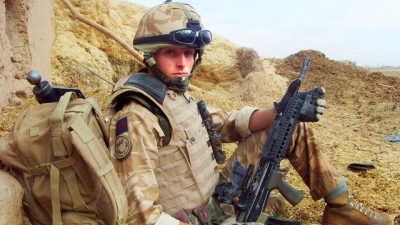
Each of the episodes from both series of Our War focuses on a different platoon or company, with varying missions during their tours in Helmand Province (which dated from between 2006 and 2012). Common themes to each of them include the youth of those involved, and the gravity of what is being asked of them.
Critical portrayals of life in the armed forces in two West End plays
Owen Everett, ForcesWatch

There are two plays on in London's West End currently that depict life in the UK military, and they do so critically. Our Boys', by Jonathan Lewis, at the Duchess Theatre is a revival, having first been performed in 1993. Sandi Toksvig's Bully Boy is at the St James Theatre. There is considerable similarity in the themes of the two plays: why young men join the armed forces, how they are often neglected when injured, and the horror of contemporary war in general.
Recently….on the Olympics, strike-breaking and the armed forces
ForcesWatch comment
In an article called 'Olympic Medals for the Military', Professor Michael Clarke, director-general of the Royal United Services Institute argues that the involvement of the military in the Olympics will bring in "a new relationship between the Armed Forces and the general public", in which the former appear "a normal and average part of a relaxed and self-confident British society.” Is normalisation of the military within everyday life a good thing? Is it the mark of a "self-confident British society" or would a better indicator of that be a far less visible presence of the military?
Recently… on militainment
ForcesWatch comment
A recent article called The Morning After: Unfriendly Fire by James Poniewozik in Time Magazine critiques a new reality TV show from the US TV channel NBC. Stars Earn Stripes, "in which celebrities are paired with soldiers to carry out special-forces-type maneuvers, was denounced by nine Nobel laureates, including South African bishop Desmond Tutu, for glamourising war and its violence by making them into entertainment."

